Minas Morgul Pt. 1: The Dead City….
~*~
This is a film scene I think truly good.
I am not crazy about the emergence of the Orc army from Minas Morgul, which reminds me too much of "The Wizard of Oz" (in which Dorothy and her friends watch from behind the rocks as the Wicked Witch of the West's guards march out of the castle singing, "Oh-ee-oh"). Viewers unfamiliar with the old film won't be bothered by this. But everything with Frodo, Sam, and Gollum is excellent. Much of the sequence is very book-like, especially the part in which Frodo feels called at the bridge.
What I love best in the film scene is Frodo. Not so much on the bridge but after they have climbed up behind the rock, parallel to the gate. His face as the Witch-king swoops by, contorted with present and remembered pain and horror overwhelms me with "pity and terror", the emotions the Greek tragedian Aeschylus said were the marks of great drama. Suffering is something which film Frodo always does well, his personal attractions often heightened in proportion to his degree of travail. This certainly is the case here. However, so deeply does the sight of him suffering in this scene move me, even my feelings of desire are overwhelmed. Whether his tears are his own or produced by a tear stick (EW confessed that he had a great deal of difficulty producing actual tears), the sight of his filthy face covered with the sweat of fear and exertion, his nose running, his eyes spilling with tears, work together to kill me. But only nearly: I am always ready to be killed again by his next ordeal.
Because there are quite a few caps for this scene, I am dividing them up between two posts. The caps showing Frodo feeling the summons at the bridge is included in this post. The caps showing him suffering as the Witch-king cries out are divided between this and the next post. A brilliant poem that jan-u-wine wrote for this scene will be included in the second part.
~*~
Film scene: “The Dead City.”
Gollum: The Dead City. Very nasty place. Full of enemies. Quick! Quick! They will see! They will see! Come away! Come away! Look! We have found it, the way into Mordor. The Secret Stairs!
Frodo starts to totter across the bridge to Minas Morgul.
Sam: No! Mr. Frodo!
Gollum: Not that way! What's it doing?
Sam: No!
Frodo: They're calling me….
Sam and Gollum pull Frodo to the stairs, but suddenly from the middle of the city a brilliant light shoots into the sky. The ground shakes. The Witch-king emerges to lead his host in battle. On his winged steed, he perches on the walls. The beast bellows and the Witch-king utters his piercing cry.
Frodo: (Wincing) I can feel his blade!
~*~
Book scene: from The Stairs of Cirith Ungol.
As soon as the great Cross-roads had been passed, the weight of it, almost forgotten in Ithilien, had begun to grow once more. Now, feeling the way become steep before his feet, he looked wearily up; and then he saw it, even as Gollum had said that he would: the city of the Ringwraiths. He cowered against the stony bank.
A long-tilted valley, a deep gulf of shadow, ran back far into the mountains. Upon the further side, some way within the valley’s arms, high on a rocky seat upon the black knees of the Ephel Dúath, stood the walls and tower of Minas Morgul. All was dark about it, earth and sky, but it was lit with light. Not the imprisoned moonlight welling through the marble walls of Minas Ithil long ago, Tower of the Moon, fair and radiant in the hollow of the hills. Paler indeed than the moon ailing in some slow eclipse was the light of it now, wavering and blowing like a noisome exhalation of decay, a corpse-light, a light that illuminated nothing.
(..)
For a moment the three companions stood there, shrinking, staring up with unwilling eyes. Gollum was the first to recover. Again he pulled at their cloaks urgently, but he spoke no word. Almost he dragged them forward. Every step was reluctant, and time seemed to slow its pace, so that between the raising of a foot and the setting of it down minutes of loathing passed.
So they came slowly to the white bridge. Here the road, gleaming faintly, passed over the stream in the midst of the valley, and went on, winding deviously up towards the city’s gate: a black mouth opening in the outer circle of the northward walls. Wide flats lay on either bank, shadowy meads filled with pale white flowers. Luminous these were too, beautiful and yet horrible of shape, like the demented forms of an uneasy dream; and they gave forth a faint sickening charnel-smell; an odour of rottenness filled the air. From mead to mead the bridge sprang. Figures stood there at its head, carven with cunning in forms human and bestial, but all corrupt and loathsome. The water flowing beneath was silent, and it steamed, but the vapour that rose from it, curling and twisting about the bridge, was deadly cold. Frodo felt his senses reeling and his mind darkening. Then suddenly, as if some force were at work other than his own will, he began to hurry, tottering forward, his groping hands held out, his head lolling from side to side. Both Sam and Gollum ran after him. Sam caught his master in his arms, as he stumbled and almost fell, right on the threshold of the bridge.
‘Not that way! No, not that way!’ whispered Gollum, but the breath between his teeth seemed to tear the heavy stillness like a whistle, and he cowered to the ground in terror.
‘Hold up, Mr. Frodo!’ muttered Sam in Frodo’s ear. ‘Come back! Not that way. Gollum says not, and for once I agree with him.’
Frodo passed his hand over his brow and wrenched his eyes away from the city on the fill. The luminous tower fascinated him, and he fought the desire that was on him to run up the gleaming road towards its gate. At last with an effort he turned back, and as he did so, he felt the Ring resisting him, dragging at the chain about his neck, and his eyes too, as he looked away, seemed for the moment to have been blinded. The darkness before him was impenetrable.
~*~
The Dead City itself is not as much like the place described in the book as I would like, but it’s still very good in the film’s geographically concentrated style. But the thing that most strikes me in the book description is perhaps not possible to depict on film. I am thinking of the way the beauty of the former Tower of the Moon is still evident, but in a mutated way. It’s still the building the Men of old Gondor built, but viewed closer the ugly additions can be seen (the mouth-gate studded with teeth, etc.). It still glows palely white (rather than green), but now it’s the white of a sepulchre, the white of ghosts and phantoms and death. Unlike the utter waste outside the Morannon where nothing, not a weed or lichen grows, its meads are filled with flowers, but they are flowers from a nightmare: “beautiful yet horrible”, blooms with fantastical, demented shapes, smelling faintly of rotting flesh.
When I read this scene, the images that come to mind are ones that might have been painted by Heironymous Bosch, the Dutch Renaissance artist who painted surreal, highly detailed, highly fascinating, and utterly horrible paintings of what people might suffer in hell, or of the temptations that would bring them there. His pictures look attractive from a distance, the compostition and colours excellent. One approaches eagerly. Is it a painting of souls entering Paradise? Peasants at a village festival? Instead one draws near to see fantastical, repulsive demons torturing sinners, or tempting victims still alive into folly and torment. That's what Tolkien's images remind me of here-the City's beauty is still there, but twisted and mutilated, so that its beauty is simultaneously horrible.
The theme of mutilated beauty runs through LotR. Nothing was created bad by Eru and the Ainur. What now is repulsive and evil was not so once. Descriptions like this one of Minas Morgul reinforce that impression. That a sense of the Moon Tower's original beauty and goodness is still perceptible only adds to the horror-and anguish-of its present degradation. The notion that the Orcs came from Elves, mutilated and mutated, adds to the horror of their present state. Sauron (and Melkor before him, the Vala who first fell from grace) once was beautiful but now is ugly, no longer able to appear in a beautiful form except in so far as he has poured his life force into the Ring, beautiful to the eye and a pleasure to touch.
I imagine Frodo’s first view of the City of the Dead to be filled with these impressions, even if he doesn't perceive them at a conscious level. The closer he gets, the more dreadful it looks-all the more dreadful because he knows it once was truly beautiful. As he gazes fascinated and appalled at the former Tower of the Moon, I imagine the dark thought threading its way inside his mind that the Tower is a sign of what he will become if he finally yields to the Ring and its maker. Perhaps it will be Sam-brave, faithful, good Sam-who will be first to know. Sam has such a keen sense of things, always on guard. Sam's sensitive nose will catch a whiff of some growing stench. It will not be the stench of Frodo's filthy clothes and body (a condition Sam shares), but the stench of decay, the decay Frodo fears is growing inside him. Like Minas Ithil/Minas Morgul, it may become true of him, too: "beautiful and yet horrible".
~*~
As usual, all the caps have been cropped and adjusted for greater brightness and sharpness.
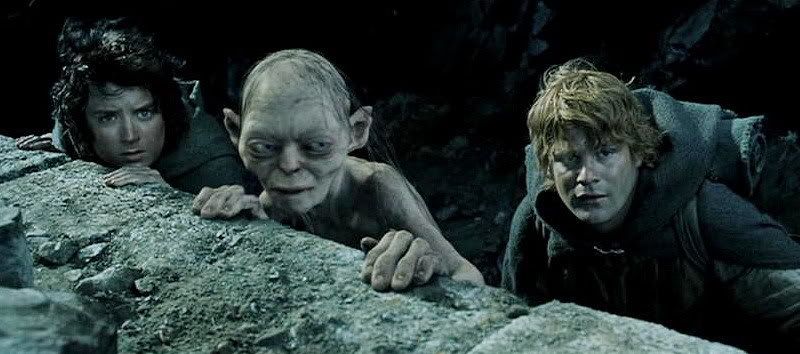
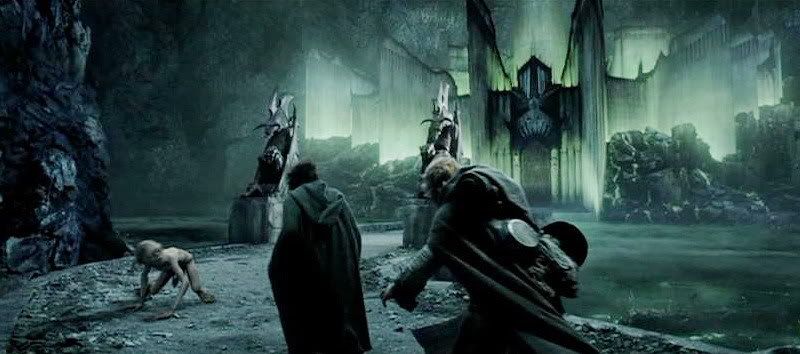
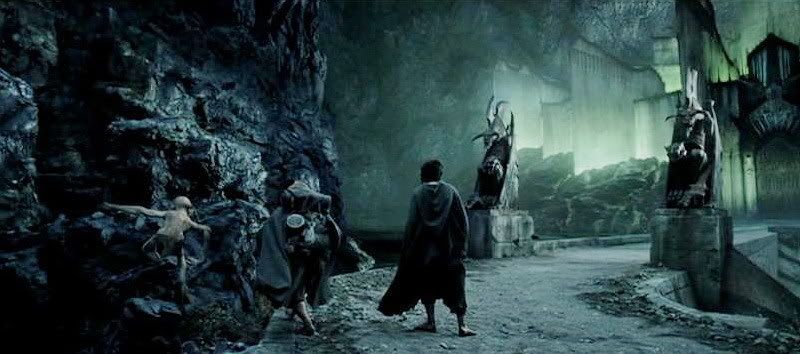
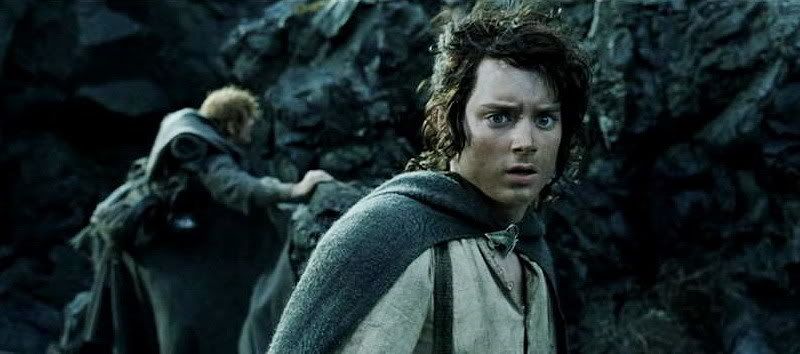
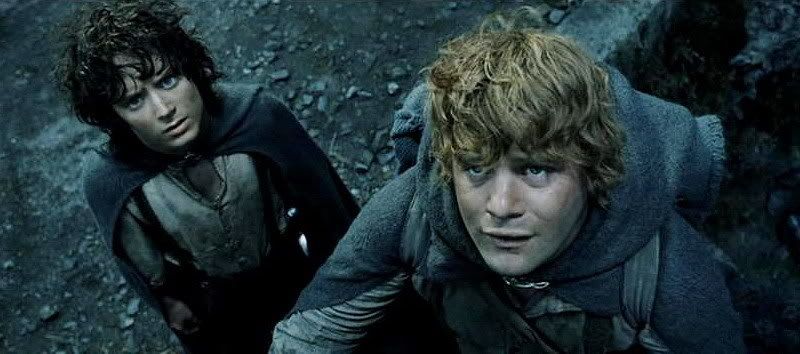
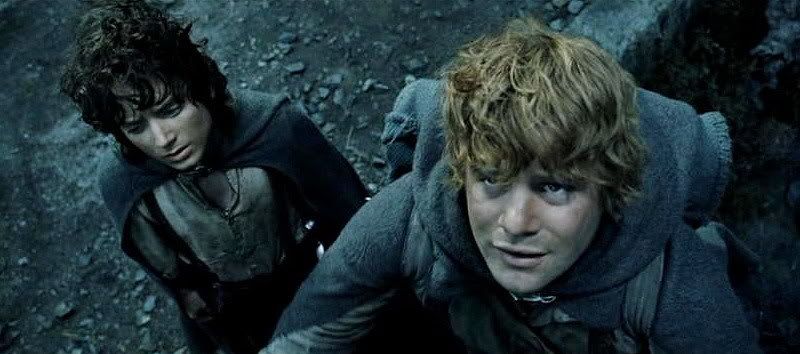
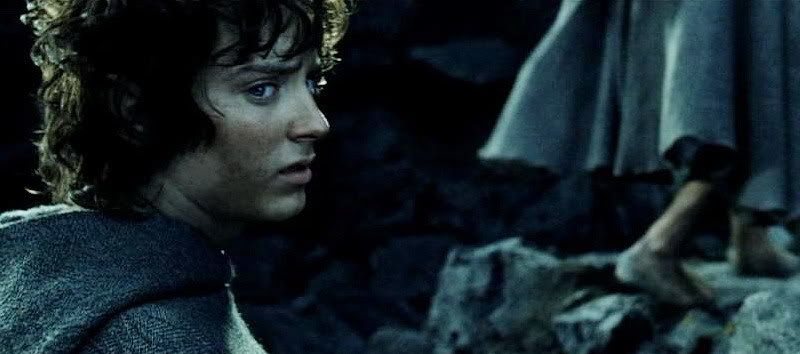
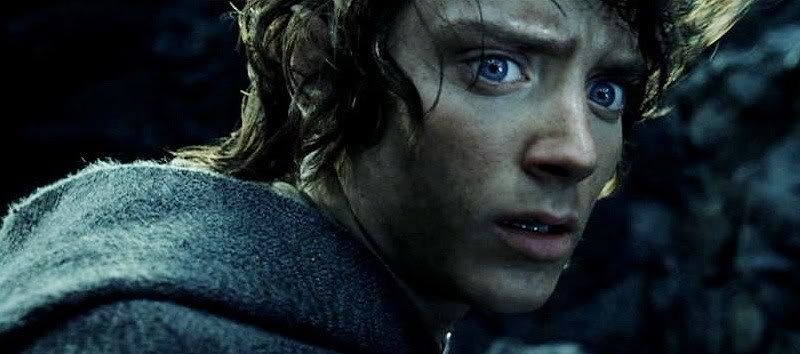
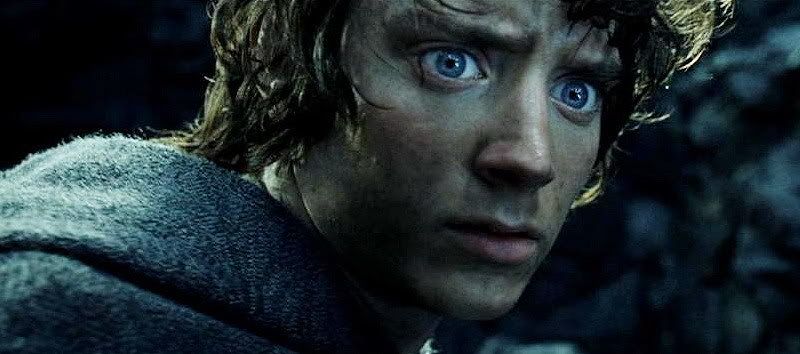
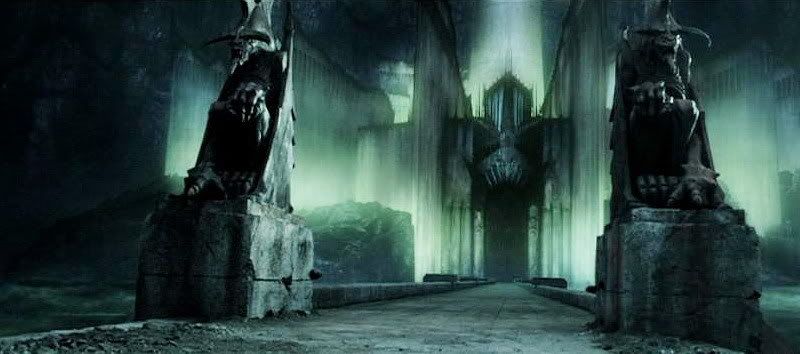
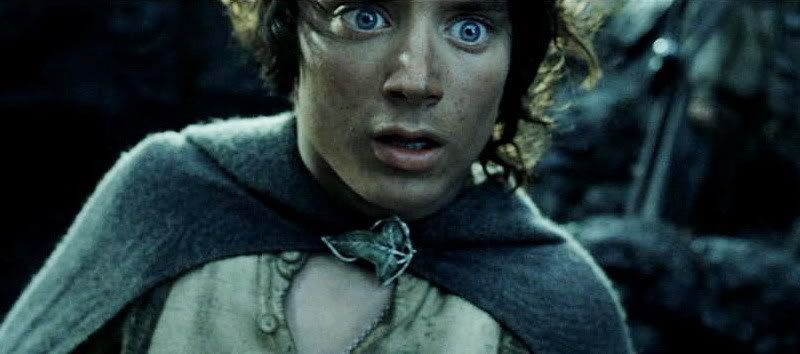
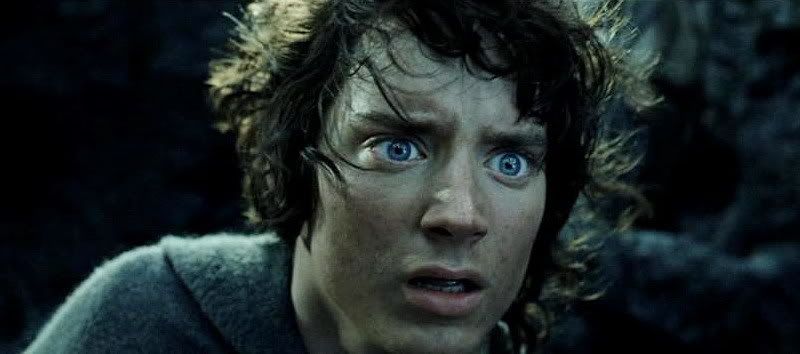
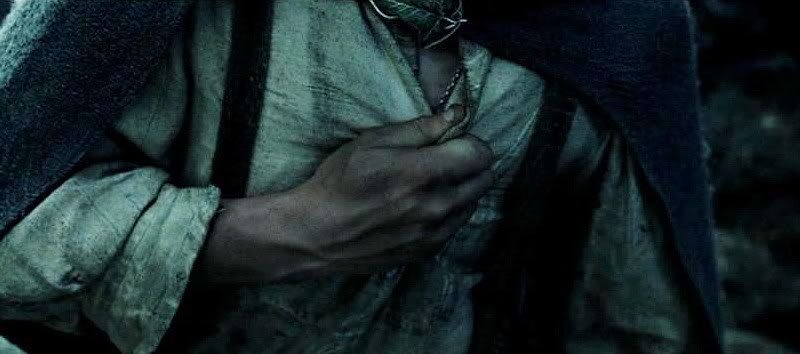
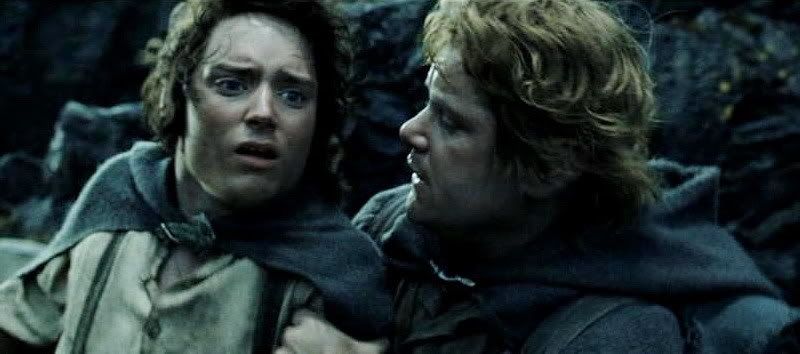
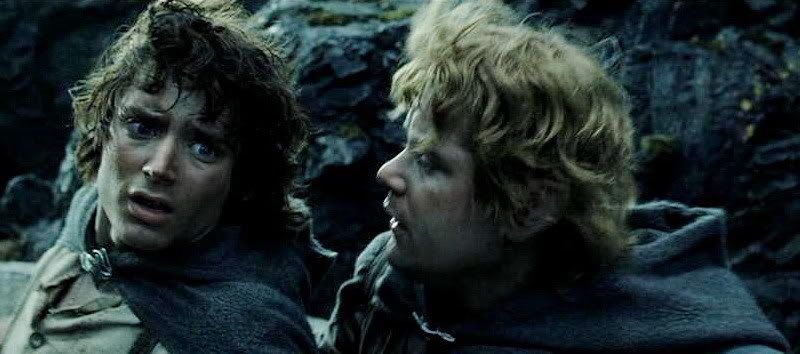
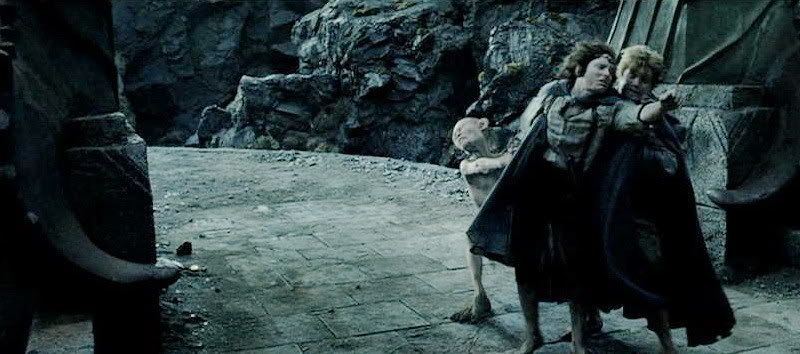
~*~
The book scene continues, from The Stairs of Cirith Ungol:
At last they could go no further without a halt…. Frodo stopped and sat down on a stone. They had now climbed up to the top of a great hump of bare rock. Ahead of them there was a bay in the valley-side, and round the head of this the path went on, no more than a wide ledge with a chasm on the right; across the sheer southward face of the mountain it crawled upwards, until it disappeared into the blackness above.
‘I must rest a while, Sam,’ whispered Frodo. ‘It’s heavy on me, Sam lad, very heavy. I wonder how far I can carry it? Anyway I must rest before we venture on to that.’ He pointed to the narrow way ahead.
(…)
At this Gollum’s fear and agitation became so great that he spoke again, hissing behind his hand, as if to keep the sound from unseen listeners in the air. ‘Not here, no. Not rest here. Fools! Eyes can see us. When they come to the bridge they will see us. Come away! Climb, climb, climb!’
‘Come, Mr. Frodo,’ said Sam. ‘He’s right again. We can’t stay here.’
‘All right,’ said Frodo in a remote voice, as of one speaking half asleep. ‘I will try.’
But it was too late. At that moment the rock quivered and trembled beneath them. The great rumbling noise, louder than ever before, rolled in the ground and echoed in the mountains. Then with searing suddenness there came a great red flash. Far beyond the eastern mountains it leapt into the sky and splashed the lowering clouds with crimson. In that valley of shadow and cold deathly light it seemed unbearably violent and fierce. Peaks of stone and ridges like notched knives sprang out in the staring black against the uprushing flame in Gorgoroth. Then came a great crack of thunder.
And Minas Morgul answered. There was a flare of livid lightnings: forks of blue flame springing up from the tower and from the encircling hills into the sullen clouds. The earth groaned; and out of the city there came a cry. Mingled with the shrill neighing of horses wild with rage and fear, there came a rending screech, shivering, rising swiftly to a piercing pitch beyond the range of hearing. The hobbits wheeled round towards it, and cast themselves down, holding their hands upon their ears.
As the terrible cry ended, falling back through a long sickening wail to silence, Frodo slowly raised his head. Across the narrow valley, now almost on a level with his eyes, the walls of the evil city stood, and its cavernous gate, shaped like an open mouth with gleaming teeth, was gaping wide. And out of the gate an army came.
(…)
Before them went a great cavalry of horsemen moving like ordered shadows, and at their head was one greater than all the rest: a Rider, all black, save that on his hooded head he had a helm like a crown that flickered with a perilous light. Now he was drawing near the bridge below, and Frodo’s staring eyes followed him, unable to wink or to withdraw. Surely there was the Lord of the Nine Riders returned to earth to lead his ghastly host to battle? Here, yes here indeed was the haggard king whose cold hand had smitten down the Ring-bearer with his deadly knife. The old wound throbbed with pain and a great chill spread towards Frodo’s heart.
Even as these thoughts pierced him with dread and held him bound as with a spell, the Rider halted suddenly, right before the entrance of the bridge, and behind him all the host stood still. There was a pause, a dead silence. Maybe it was the Ring that called to the Wraith-lord, and for a moment he was troubled, sensing some other power within his valley. This way and that turned the dark head helmed and crowned with fear, sweeping the shadows with its unseen eyes. Frodo waited, like a bird at the approach of a snake, unable to move. And as he waited, he felt, more urgent than ever before, the command that he should put on the Ring. But great as the pressure was, he felt no inclination now to yield to it. He knew that the Ring would only betray him, and he had not, even if he put it on, the power to face the Morgul-king-not yet. There was no longer any answer to that command in his own will, dismayed by terror though it was, and he felt only the beating upon him of a great power from outside. It took his hand, and as Frodo watched with his mind, not willing it but in suspense (as if he looked on some old story far away), it moved the hand inch by inch towards the chain upon his neck. Then his own will stirred; slowly it forced the hand back and set it to find another thing, a thing lying hidden near his breast. Cold and hard it seemed as his grip closed on it: the phial of Galadriel, so long treasured, and almost forgotten till that hour. As he touched it, for a while all thought of the Ring was banished from his mind. He sighed and bent his head.
~*~
I repeat Frodo's crowning moment for good measure (bold emphases mine):
...as he waited, he felt, more urgent than ever before, the command that he should put on the Ring. But great as the pressure was, he felt no inclination now to yield to it. He knew that the Ring would only betray him. (...) Then his own will stirred; slowly it forced the hand back....
That's Frodo of the book. His will was honed and made stronger by his ordeal, not weakened. When I look at the screencaps of his face as he suffers under the cry of the Witch-king (more to come in the second part), I think of this book moment, so crucial for understanding Frodo's growth as a character.
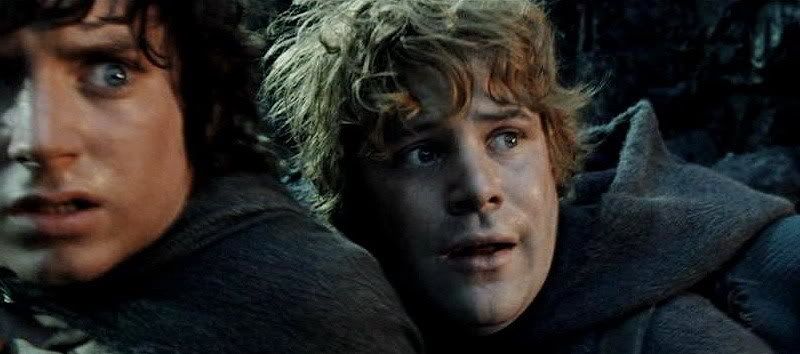
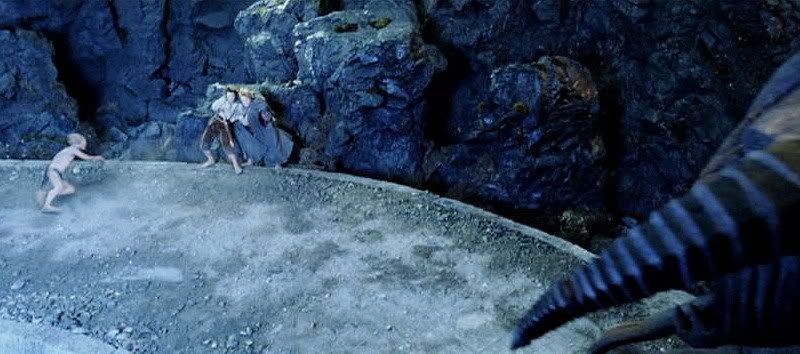
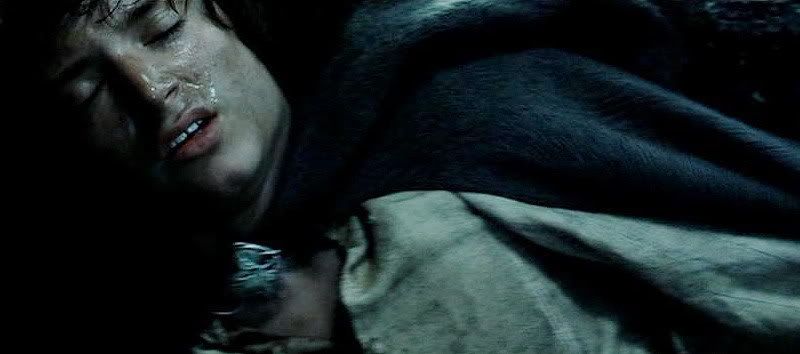
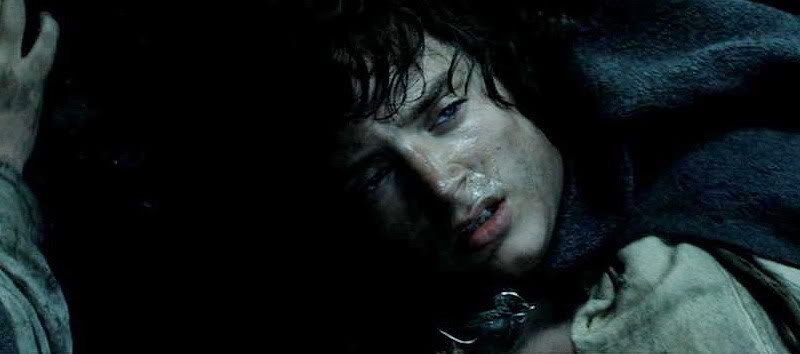
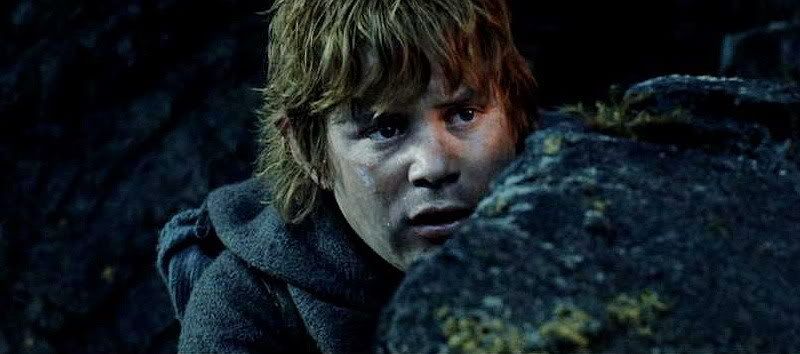
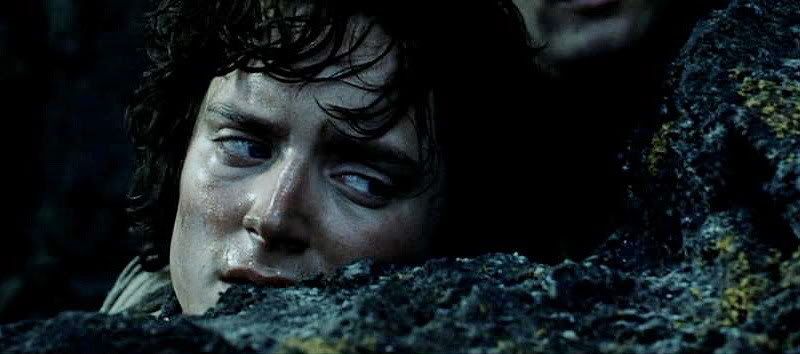
~*~
Related Entries:
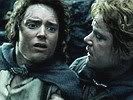
~ Minas Morgul Pt. 1: The Dead City.
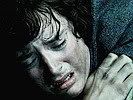
~ Minas Morgul Pt. 2: ‘No one will ever know', with jan-u-wine's "Moon Tower".
Tables of Links:
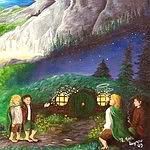
~ Entries with jan-u-wine's poems.
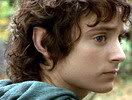
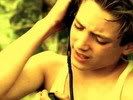
~ All Frodo and Elijah screencaps.
~ Mechtild
This is a film scene I think truly good.
I am not crazy about the emergence of the Orc army from Minas Morgul, which reminds me too much of "The Wizard of Oz" (in which Dorothy and her friends watch from behind the rocks as the Wicked Witch of the West's guards march out of the castle singing, "Oh-ee-oh"). Viewers unfamiliar with the old film won't be bothered by this. But everything with Frodo, Sam, and Gollum is excellent. Much of the sequence is very book-like, especially the part in which Frodo feels called at the bridge.
What I love best in the film scene is Frodo. Not so much on the bridge but after they have climbed up behind the rock, parallel to the gate. His face as the Witch-king swoops by, contorted with present and remembered pain and horror overwhelms me with "pity and terror", the emotions the Greek tragedian Aeschylus said were the marks of great drama. Suffering is something which film Frodo always does well, his personal attractions often heightened in proportion to his degree of travail. This certainly is the case here. However, so deeply does the sight of him suffering in this scene move me, even my feelings of desire are overwhelmed. Whether his tears are his own or produced by a tear stick (EW confessed that he had a great deal of difficulty producing actual tears), the sight of his filthy face covered with the sweat of fear and exertion, his nose running, his eyes spilling with tears, work together to kill me. But only nearly: I am always ready to be killed again by his next ordeal.
Because there are quite a few caps for this scene, I am dividing them up between two posts. The caps showing Frodo feeling the summons at the bridge is included in this post. The caps showing him suffering as the Witch-king cries out are divided between this and the next post. A brilliant poem that jan-u-wine wrote for this scene will be included in the second part.
~*~
Film scene: “The Dead City.”
Gollum: The Dead City. Very nasty place. Full of enemies. Quick! Quick! They will see! They will see! Come away! Come away! Look! We have found it, the way into Mordor. The Secret Stairs!
Frodo starts to totter across the bridge to Minas Morgul.
Sam: No! Mr. Frodo!
Gollum: Not that way! What's it doing?
Sam: No!
Frodo: They're calling me….
Sam and Gollum pull Frodo to the stairs, but suddenly from the middle of the city a brilliant light shoots into the sky. The ground shakes. The Witch-king emerges to lead his host in battle. On his winged steed, he perches on the walls. The beast bellows and the Witch-king utters his piercing cry.
Frodo: (Wincing) I can feel his blade!
~*~
Book scene: from The Stairs of Cirith Ungol.
As soon as the great Cross-roads had been passed, the weight of it, almost forgotten in Ithilien, had begun to grow once more. Now, feeling the way become steep before his feet, he looked wearily up; and then he saw it, even as Gollum had said that he would: the city of the Ringwraiths. He cowered against the stony bank.
A long-tilted valley, a deep gulf of shadow, ran back far into the mountains. Upon the further side, some way within the valley’s arms, high on a rocky seat upon the black knees of the Ephel Dúath, stood the walls and tower of Minas Morgul. All was dark about it, earth and sky, but it was lit with light. Not the imprisoned moonlight welling through the marble walls of Minas Ithil long ago, Tower of the Moon, fair and radiant in the hollow of the hills. Paler indeed than the moon ailing in some slow eclipse was the light of it now, wavering and blowing like a noisome exhalation of decay, a corpse-light, a light that illuminated nothing.
(..)
For a moment the three companions stood there, shrinking, staring up with unwilling eyes. Gollum was the first to recover. Again he pulled at their cloaks urgently, but he spoke no word. Almost he dragged them forward. Every step was reluctant, and time seemed to slow its pace, so that between the raising of a foot and the setting of it down minutes of loathing passed.
So they came slowly to the white bridge. Here the road, gleaming faintly, passed over the stream in the midst of the valley, and went on, winding deviously up towards the city’s gate: a black mouth opening in the outer circle of the northward walls. Wide flats lay on either bank, shadowy meads filled with pale white flowers. Luminous these were too, beautiful and yet horrible of shape, like the demented forms of an uneasy dream; and they gave forth a faint sickening charnel-smell; an odour of rottenness filled the air. From mead to mead the bridge sprang. Figures stood there at its head, carven with cunning in forms human and bestial, but all corrupt and loathsome. The water flowing beneath was silent, and it steamed, but the vapour that rose from it, curling and twisting about the bridge, was deadly cold. Frodo felt his senses reeling and his mind darkening. Then suddenly, as if some force were at work other than his own will, he began to hurry, tottering forward, his groping hands held out, his head lolling from side to side. Both Sam and Gollum ran after him. Sam caught his master in his arms, as he stumbled and almost fell, right on the threshold of the bridge.
‘Not that way! No, not that way!’ whispered Gollum, but the breath between his teeth seemed to tear the heavy stillness like a whistle, and he cowered to the ground in terror.
‘Hold up, Mr. Frodo!’ muttered Sam in Frodo’s ear. ‘Come back! Not that way. Gollum says not, and for once I agree with him.’
Frodo passed his hand over his brow and wrenched his eyes away from the city on the fill. The luminous tower fascinated him, and he fought the desire that was on him to run up the gleaming road towards its gate. At last with an effort he turned back, and as he did so, he felt the Ring resisting him, dragging at the chain about his neck, and his eyes too, as he looked away, seemed for the moment to have been blinded. The darkness before him was impenetrable.
~*~
The Dead City itself is not as much like the place described in the book as I would like, but it’s still very good in the film’s geographically concentrated style. But the thing that most strikes me in the book description is perhaps not possible to depict on film. I am thinking of the way the beauty of the former Tower of the Moon is still evident, but in a mutated way. It’s still the building the Men of old Gondor built, but viewed closer the ugly additions can be seen (the mouth-gate studded with teeth, etc.). It still glows palely white (rather than green), but now it’s the white of a sepulchre, the white of ghosts and phantoms and death. Unlike the utter waste outside the Morannon where nothing, not a weed or lichen grows, its meads are filled with flowers, but they are flowers from a nightmare: “beautiful yet horrible”, blooms with fantastical, demented shapes, smelling faintly of rotting flesh.
When I read this scene, the images that come to mind are ones that might have been painted by Heironymous Bosch, the Dutch Renaissance artist who painted surreal, highly detailed, highly fascinating, and utterly horrible paintings of what people might suffer in hell, or of the temptations that would bring them there. His pictures look attractive from a distance, the compostition and colours excellent. One approaches eagerly. Is it a painting of souls entering Paradise? Peasants at a village festival? Instead one draws near to see fantastical, repulsive demons torturing sinners, or tempting victims still alive into folly and torment. That's what Tolkien's images remind me of here-the City's beauty is still there, but twisted and mutilated, so that its beauty is simultaneously horrible.
The theme of mutilated beauty runs through LotR. Nothing was created bad by Eru and the Ainur. What now is repulsive and evil was not so once. Descriptions like this one of Minas Morgul reinforce that impression. That a sense of the Moon Tower's original beauty and goodness is still perceptible only adds to the horror-and anguish-of its present degradation. The notion that the Orcs came from Elves, mutilated and mutated, adds to the horror of their present state. Sauron (and Melkor before him, the Vala who first fell from grace) once was beautiful but now is ugly, no longer able to appear in a beautiful form except in so far as he has poured his life force into the Ring, beautiful to the eye and a pleasure to touch.
I imagine Frodo’s first view of the City of the Dead to be filled with these impressions, even if he doesn't perceive them at a conscious level. The closer he gets, the more dreadful it looks-all the more dreadful because he knows it once was truly beautiful. As he gazes fascinated and appalled at the former Tower of the Moon, I imagine the dark thought threading its way inside his mind that the Tower is a sign of what he will become if he finally yields to the Ring and its maker. Perhaps it will be Sam-brave, faithful, good Sam-who will be first to know. Sam has such a keen sense of things, always on guard. Sam's sensitive nose will catch a whiff of some growing stench. It will not be the stench of Frodo's filthy clothes and body (a condition Sam shares), but the stench of decay, the decay Frodo fears is growing inside him. Like Minas Ithil/Minas Morgul, it may become true of him, too: "beautiful and yet horrible".
~*~
As usual, all the caps have been cropped and adjusted for greater brightness and sharpness.
















~*~
The book scene continues, from The Stairs of Cirith Ungol:
At last they could go no further without a halt…. Frodo stopped and sat down on a stone. They had now climbed up to the top of a great hump of bare rock. Ahead of them there was a bay in the valley-side, and round the head of this the path went on, no more than a wide ledge with a chasm on the right; across the sheer southward face of the mountain it crawled upwards, until it disappeared into the blackness above.
‘I must rest a while, Sam,’ whispered Frodo. ‘It’s heavy on me, Sam lad, very heavy. I wonder how far I can carry it? Anyway I must rest before we venture on to that.’ He pointed to the narrow way ahead.
(…)
At this Gollum’s fear and agitation became so great that he spoke again, hissing behind his hand, as if to keep the sound from unseen listeners in the air. ‘Not here, no. Not rest here. Fools! Eyes can see us. When they come to the bridge they will see us. Come away! Climb, climb, climb!’
‘Come, Mr. Frodo,’ said Sam. ‘He’s right again. We can’t stay here.’
‘All right,’ said Frodo in a remote voice, as of one speaking half asleep. ‘I will try.’
But it was too late. At that moment the rock quivered and trembled beneath them. The great rumbling noise, louder than ever before, rolled in the ground and echoed in the mountains. Then with searing suddenness there came a great red flash. Far beyond the eastern mountains it leapt into the sky and splashed the lowering clouds with crimson. In that valley of shadow and cold deathly light it seemed unbearably violent and fierce. Peaks of stone and ridges like notched knives sprang out in the staring black against the uprushing flame in Gorgoroth. Then came a great crack of thunder.
And Minas Morgul answered. There was a flare of livid lightnings: forks of blue flame springing up from the tower and from the encircling hills into the sullen clouds. The earth groaned; and out of the city there came a cry. Mingled with the shrill neighing of horses wild with rage and fear, there came a rending screech, shivering, rising swiftly to a piercing pitch beyond the range of hearing. The hobbits wheeled round towards it, and cast themselves down, holding their hands upon their ears.
As the terrible cry ended, falling back through a long sickening wail to silence, Frodo slowly raised his head. Across the narrow valley, now almost on a level with his eyes, the walls of the evil city stood, and its cavernous gate, shaped like an open mouth with gleaming teeth, was gaping wide. And out of the gate an army came.
(…)
Before them went a great cavalry of horsemen moving like ordered shadows, and at their head was one greater than all the rest: a Rider, all black, save that on his hooded head he had a helm like a crown that flickered with a perilous light. Now he was drawing near the bridge below, and Frodo’s staring eyes followed him, unable to wink or to withdraw. Surely there was the Lord of the Nine Riders returned to earth to lead his ghastly host to battle? Here, yes here indeed was the haggard king whose cold hand had smitten down the Ring-bearer with his deadly knife. The old wound throbbed with pain and a great chill spread towards Frodo’s heart.
Even as these thoughts pierced him with dread and held him bound as with a spell, the Rider halted suddenly, right before the entrance of the bridge, and behind him all the host stood still. There was a pause, a dead silence. Maybe it was the Ring that called to the Wraith-lord, and for a moment he was troubled, sensing some other power within his valley. This way and that turned the dark head helmed and crowned with fear, sweeping the shadows with its unseen eyes. Frodo waited, like a bird at the approach of a snake, unable to move. And as he waited, he felt, more urgent than ever before, the command that he should put on the Ring. But great as the pressure was, he felt no inclination now to yield to it. He knew that the Ring would only betray him, and he had not, even if he put it on, the power to face the Morgul-king-not yet. There was no longer any answer to that command in his own will, dismayed by terror though it was, and he felt only the beating upon him of a great power from outside. It took his hand, and as Frodo watched with his mind, not willing it but in suspense (as if he looked on some old story far away), it moved the hand inch by inch towards the chain upon his neck. Then his own will stirred; slowly it forced the hand back and set it to find another thing, a thing lying hidden near his breast. Cold and hard it seemed as his grip closed on it: the phial of Galadriel, so long treasured, and almost forgotten till that hour. As he touched it, for a while all thought of the Ring was banished from his mind. He sighed and bent his head.
~*~
I repeat Frodo's crowning moment for good measure (bold emphases mine):
...as he waited, he felt, more urgent than ever before, the command that he should put on the Ring. But great as the pressure was, he felt no inclination now to yield to it. He knew that the Ring would only betray him. (...) Then his own will stirred; slowly it forced the hand back....
That's Frodo of the book. His will was honed and made stronger by his ordeal, not weakened. When I look at the screencaps of his face as he suffers under the cry of the Witch-king (more to come in the second part), I think of this book moment, so crucial for understanding Frodo's growth as a character.






~*~
Related Entries:
~ Minas Morgul Pt. 1: The Dead City.
~ Minas Morgul Pt. 2: ‘No one will ever know', with jan-u-wine's "Moon Tower".
Tables of Links:
~ Entries with jan-u-wine's poems.
~ All Frodo and Elijah screencaps.
~ Mechtild